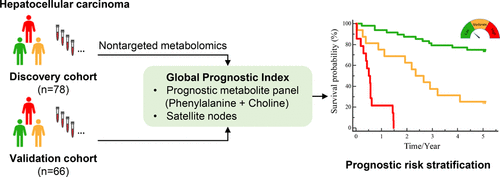当前位置:
X-MOL 学术
›
J. Proteome Res.
›
论文详情
Our official English website, www.x-mol.net, welcomes your feedback! (Note: you will need to create a separate account there.)
Liquid Chromatography-Mass Spectrometry-Based Nontargeted Metabolomics Predicts Prognosis of Hepatocellular Carcinoma after Curative Resection.
Journal of Proteome Research ( IF 4.4 ) Pub Date : 2020-07-03 , DOI: 10.1021/acs.jproteome.0c00344 Qingqing Wang 1, 2 , Benzhe Su 3 , Liwei Dong 4 , Tianyi Jiang 4 , Yexiong Tan 4 , Xin Lu 1 , Xinyu Liu 1 , Xiaohui Lin 3 , Guowang Xu 1
Journal of Proteome Research ( IF 4.4 ) Pub Date : 2020-07-03 , DOI: 10.1021/acs.jproteome.0c00344 Qingqing Wang 1, 2 , Benzhe Su 3 , Liwei Dong 4 , Tianyi Jiang 4 , Yexiong Tan 4 , Xin Lu 1 , Xinyu Liu 1 , Xiaohui Lin 3 , Guowang Xu 1
Affiliation

|
Assessment and prediction of prognostic risk in patients with hepatocellular carcinoma (HCC) would greatly benefit the optimal treatment selection. Here, we aimed to identify the critical metabolites associated with the outcomes and develop a risk score to assess the prognosis of HCC patients after curative resection. A total of 78 serum samples of HCC patients were analyzed by liquid chromatography–mass spectrometry to characterize the metabolic profiling. A novel network-based feature selection method (NFSM) was developed to define the critical metabolites with the most discriminant capacity to outcomes. The metabolites defined by NFSM was further reduced by Cox regression analysis to generate a prognostic metabolite panel—phenylalanine and choline. Furthermore, univariate and multivariate Cox regression analyses were applied to combine the metabolite panel with the presence of satellite nodes to generate a global prognostic index (GPI) score for overall survival assessment. Compared with the current clinical classification systems, including the Barcelona-clinic liver cancer stage, tumor–node–metastasis stage, and albumin–bilirubin grade, the GPI score presented comparable performance, according to the time-dependent receiver operating characteristic curves and was validated in an independent cohort, which suggested that metabolomics could serve as a helpful tool to stratify the HCC prognostic risk after operation.
中文翻译:

基于液相色谱-质谱的非靶向代谢组学预测治愈性切除后肝细胞癌的预后。
肝细胞癌(HCC)患者的评估和预后风险将大大有利于最佳治疗选择。在这里,我们旨在确定与结局相关的关键代谢物,并制定风险评分以评估根治性切除后HCC患者的预后。通过液相色谱-质谱法分析了总共78例HCC患者的血清样本,以表征代谢谱。开发了一种新颖的基于网络的特征选择方法(NFSM),以定义对结果具有最高判别能力的关键代谢物。通过Cox回归分析进一步减少了NFSM定义的代谢物,从而生成了预后性代谢物组-苯丙氨酸和胆碱。此外,应用单变量和多变量Cox回归分析将代谢物组与卫星结点的存在相结合,以产生整体预后评估(GPI)评分,以进行总体生存评估。与目前的临床分类系统(包括巴塞罗那-临床肝癌分期,肿瘤-淋巴结转移期和白蛋白-胆红素等级)相比,GPI评分表现出可比的性能,根据时间相关的受体工作特征曲线进行了验证。在一个独立的队列中,这表明代谢组学可以作为对术后肝癌预后风险进行分层的有用工具。
更新日期:2020-08-08
中文翻译:

基于液相色谱-质谱的非靶向代谢组学预测治愈性切除后肝细胞癌的预后。
肝细胞癌(HCC)患者的评估和预后风险将大大有利于最佳治疗选择。在这里,我们旨在确定与结局相关的关键代谢物,并制定风险评分以评估根治性切除后HCC患者的预后。通过液相色谱-质谱法分析了总共78例HCC患者的血清样本,以表征代谢谱。开发了一种新颖的基于网络的特征选择方法(NFSM),以定义对结果具有最高判别能力的关键代谢物。通过Cox回归分析进一步减少了NFSM定义的代谢物,从而生成了预后性代谢物组-苯丙氨酸和胆碱。此外,应用单变量和多变量Cox回归分析将代谢物组与卫星结点的存在相结合,以产生整体预后评估(GPI)评分,以进行总体生存评估。与目前的临床分类系统(包括巴塞罗那-临床肝癌分期,肿瘤-淋巴结转移期和白蛋白-胆红素等级)相比,GPI评分表现出可比的性能,根据时间相关的受体工作特征曲线进行了验证。在一个独立的队列中,这表明代谢组学可以作为对术后肝癌预后风险进行分层的有用工具。



























 京公网安备 11010802027423号
京公网安备 11010802027423号